TD Jim O’ Callaghan (FF) reacts to the latest removal of asylum seekers to alternative accommodation
109 asylum seekers offered accommodation
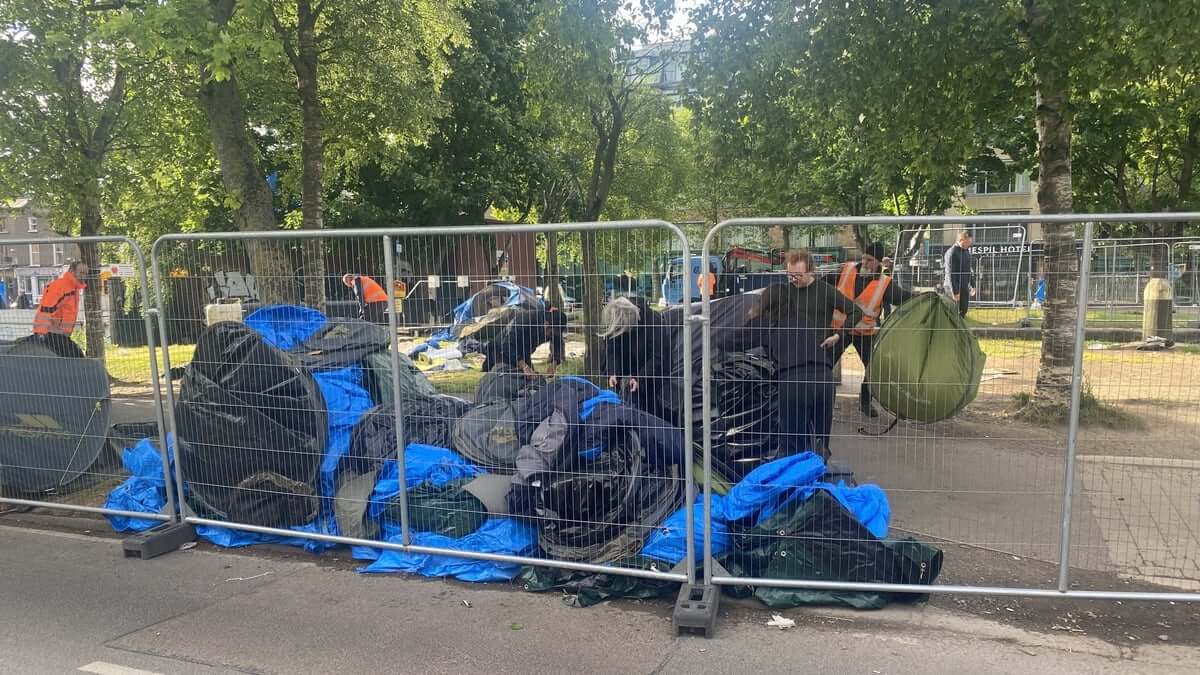
Jim O’Callaghan responds on government plan to cut payments to Ukrainian’s
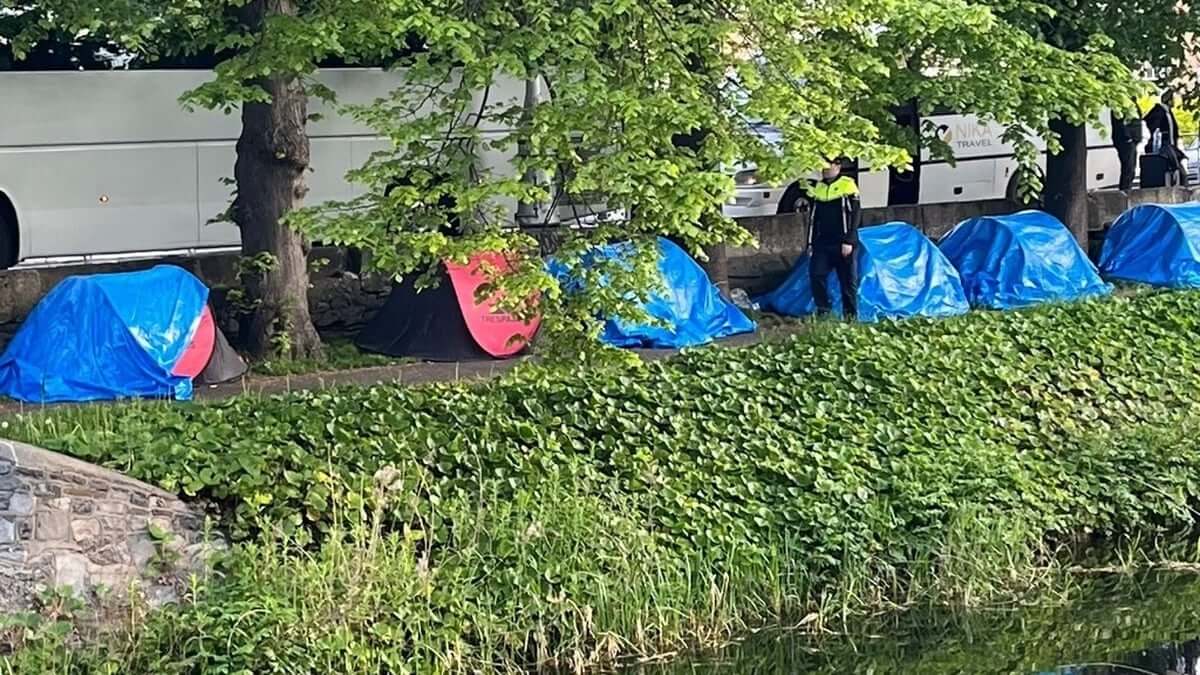
On RTÉ Radio 1 with Tom McEnaney, Media Consultant & Founder of Effective Aid Ukraine // Jim O’Callaghan, Fianna Fail TD for Dublin Bay South and party spokesman for justice // James Waterhouse, BBC Ukraine correspondent.
Jim O’Callaghan Condemns Mount Street’s Dangerous and Unacceptable Situation
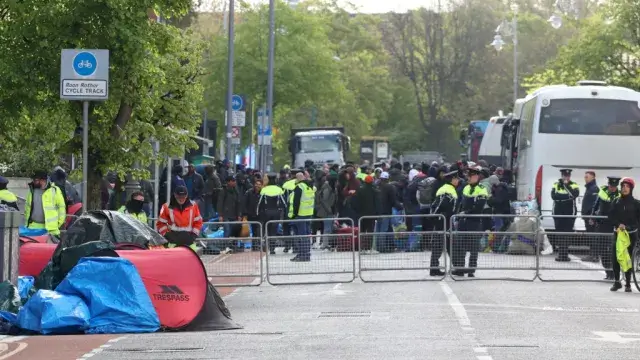
In a recent statement, Fianna Fáil TD Jim O’Callaghan has drawn attention to the precarious conditions prevailing on Mount Street, labeling them as both perilous and intolerable. O’Callaghan’s remarks highlight a pressing need for proactive measures to rectify the situation, stressing the imperative for relevant authorities to step in and address the burgeoning concerns. Urgency is paramount, he asserts, in safeguarding the welfare and security of the local community.
Picture credit: breakingnews.ie
Maternity Protection (Amendment) Bill 2024: First Stage
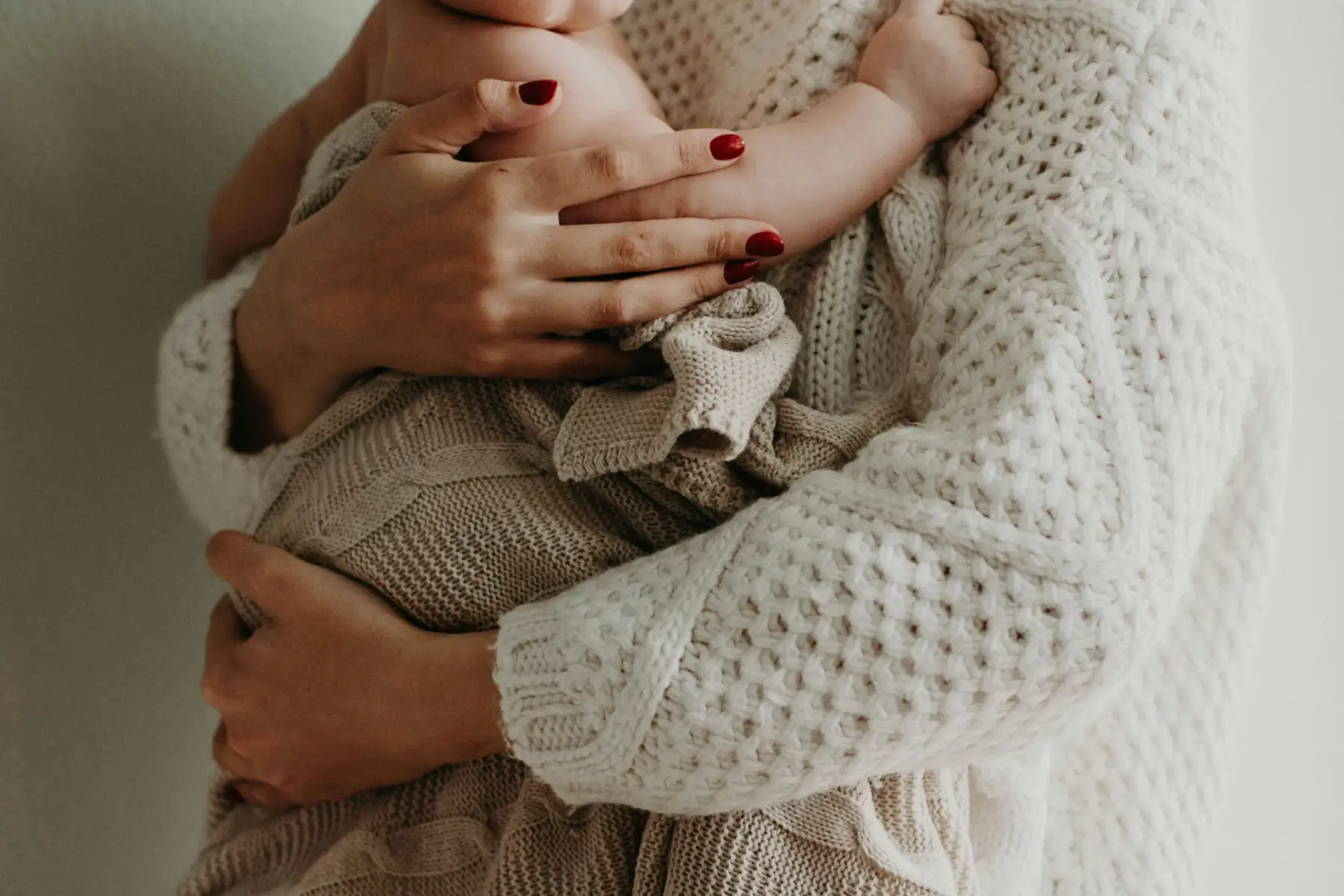
That leave be granted to introduce a Bill entitled an Act to amend and extend the Maternity Protection Act 1994 and to provide for postponement of maternity leave where a mother has been diagnosed with cancer or other serious illness during pregnancy, and to provide for related matters.
The purpose of this Bill is to amend the maternity protection Acts so that a mother who has recently given birth to a child but who has been diagnosed during pregnancy or immediately after it with cancer or another serious illness may propose postpone her maternity leave until after she has had treatment for the cancer or the serious illness. Each year in Ireland approximately 60 women are diagnosed with cancer during pregnancy or immediately after the birth of their child. I do not have specific statistics on the number of women who are diagnosed with another serious illness during pregnancy or immediately after the birth of their child but I suspect it is as high. Approximately 120 to 150 women per year find themselves in the very distressful and unfortunate position that at a time just after they have given birth to a child and should be enjoying their maternity leave, instead they find themselves in the situation where they are effectively on sick leave and are getting treated for cancer or another serious illness.
The effect of that is the time they are supposed to be spending on maternity leave is being eaten up by treatment for their illness. In effect, the maternity leave to which they are entitled never really comes into operation because while they are out from work in the immediate aftermath of the birth of their child, they are being treated for a serious illness that in ordinary course is covered by sick leave.
This is an unfortunate, and clearly not an intended, circumstance that exists within our legislation. It is, however, something that could be rectified by the enactment of this legislation.
I wish the Taoiseach all the best in his future career and, in fairness to him, he played a significant role in introducing paternity leave in Ireland. It would be a worthwhile addition to his legacy if he expedited this legislation. The reason for that is that we find ourselves in the unusual position where men in Ireland are able to postpone their paternity leave to a time that suits them. Conversely, however, women have no similar entitlement to postpone their maternity leave in circumstances where they have been diagnosed with cancer or another serious illness. I am concerned that this dichotomy between the treatment of men and women may raise issues under Article 40.1 of the Constitution but, notwithstanding that, every Member will recognise that there is an inherent unfairness in not permitting women to postpone their maternity leave so that they can enjoy their time with their child after they have had their treatment for the serious illness. The effect of not doing so means that they do not really get the benefit of the maternity leave that every Member knows is so important.
The legislation seeks to amend the Maternity Protection Bill, which was enacted in 1994 and which was further amended in 2004. The proposed legislation seeks to introduce a new section 14(c) after 14(b). It provides that a woman who has been diagnosed with cancer or another serious illness during pregnancy or in the immediate aftermath of her pregnancy may then postpone that maternity leave to a time when she has recovered from the illness or the cancer.
It then proposes after that a certain regime, which takes into account the entitlement of the employer to be apprised of the fact that the woman is seeking to postpone the maternity leave. It also seeks to recognise the fact that this will not interfere with any entitlements an employee may have to sick leave under the Sick Leave Act 2022.
I ask that consideration be given to this Bill. As I have mentioned, the Taoiseach deserves to be commended on the role he played with regard to paternity laws that were introduced. We have a situation such as this, where the maternity laws are manifestly unfair to that very small cohort of women who find themselves in the unfortunate situation that their maternity leave has been overtaken by sick leave because of an illness they have contracted during pregnancy or afterwards. They are then precluded from the benefits of the Acts. It is something that everyone in the House will agree would be of benefit to women. It has the support of the Irish Cancer Society and I am sure it has the support of other organisations as well who have the priority of women at the foremost of their interest.
Dáil Éireann debate – Wednesday, 20 Mar 2024
An Bille um Chosaint Máithreachais (Leasú), 2024 Maternity Protection (Amendment) Bill 2024
Jim O’Callaghan calls for expanded legal aid for domestic violence after judge warns ‘working poor’ lose out
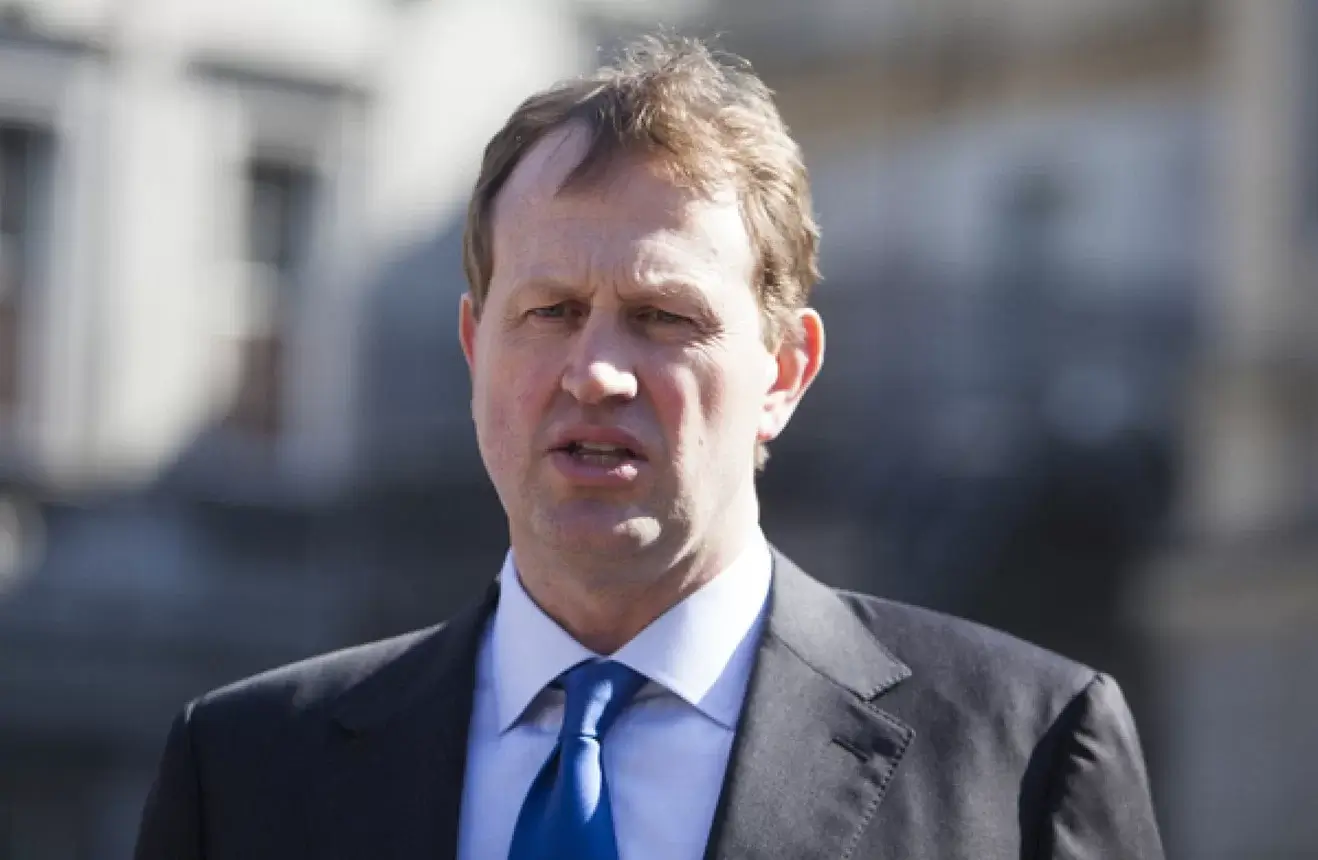
FIANNA FÁIL’S JUSTICE spokesman Jim O’Callaghan has called for the government to “carefully consider and act upon” remarks made by a District Court judge in which he called for mandatory legal aid for all domestic violence cases.
Opposition justice spokespeople have also called for the legal aid income threshold to be revised, with Labour’s Aodhán Ó Ríordán pledging to raise Judge John Campbell’s remarks with Minister for Justice Helen McEntee when the Dáil resumes.
Remembering the Good Friday Agreement
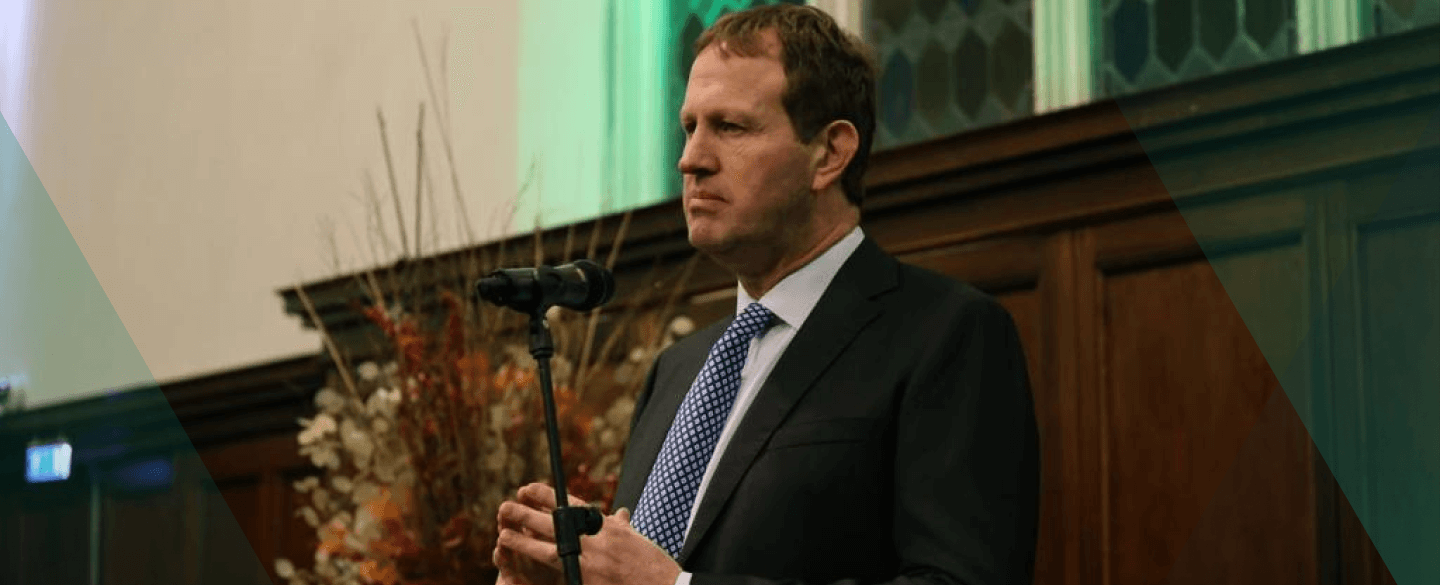
You’ll be aware that 25 years ago, the Good Friday agreement was signed. It was a transformative agreement and it was an internationally recognized agreement of importance and it really changed politics on this island for the better.
And although we still have very many ongoing problems with politics in Northern Ireland, those of you here who are my age or older will recall how great things have got since that agreement no longer.
Do we wake up in the morning time, hearing about people being lost, been murdered, have been killed in violence.
And I suppose one of the singular achievements of the Good Friday Agreement is that there’s no acceptance throughout this country amongst all political parties and organizations that violence is unacceptable for the purpose of trying to achieve political objectives.
“My ultimate political aspiration remains the coming together of all the people of Ireland achieved peacefully and by consent.”
The Irish Tricolour – A Flag of Diversity
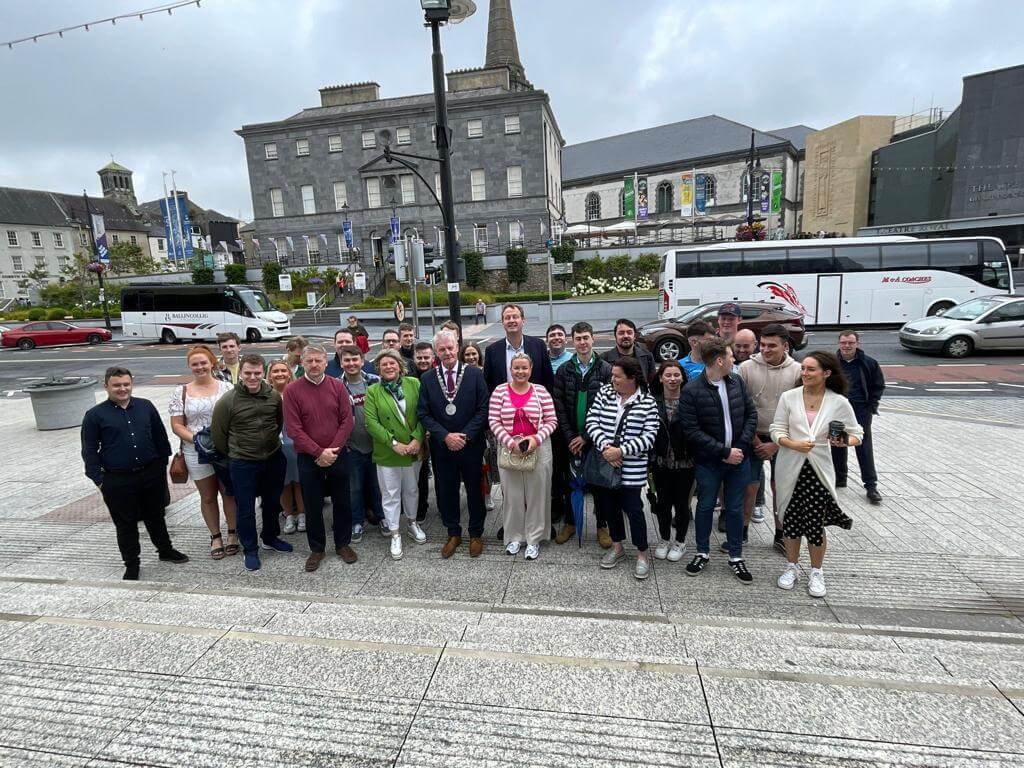
Jim O’Callaghan TD
Waterford Ógra Summer School
24 July 2022
Preliminary
I want to thank the Cathaoirleach of Ógra Waterford for inviting me to give this address this morning. This is the second time I have been in Waterford in recent weeks, having attended earlier this month the funeral of Councillor James Tobin. That was a very sad occasion but it gave me an insight into the affection and support that Waterford people give to those elected representatives who serve them well.
Today is a happier occasion and I am very honoured to give this address which seeks to honour the Irish Tricolour that was first flown in Waterford by Thomas Francis Meagher from the headquarters of the Wolfe Tone Confederate Club at 33 The Mall during the 1848 Rebellion. This Summer School wants to focus on the inclusiveness and diversity of Irish Republicanism, as symbolised by its flag.
In order to appreciate this inclusivity and diversity we need to reflect on the important decision that Meagher made in 1843 when he decided to join the Young Irelanders. This group of young radicals expressed their Republicanism through the newspaper they published called “The Nation”. The people behind this newspaper were Thomas Davis, a Cork protestant; John Blake Dillon, a Mayo Catholic; Charles Gavin Duffy, a Northern Catholic and subsequently John Mitchell, a Unitarian Minister. Along with Meagher they represented the diversity of Ireland in the mid 19th century, and they were united in their desire to end the oppression of Irish Catholics and the governance of Ireland from Westminster. Although such a group of men may not be viewed today as diverse, the breadth of their backgrounds and the elevation of their political beliefs above their religious or personal interests was a real mark of diversity in mid-19th century Ireland.
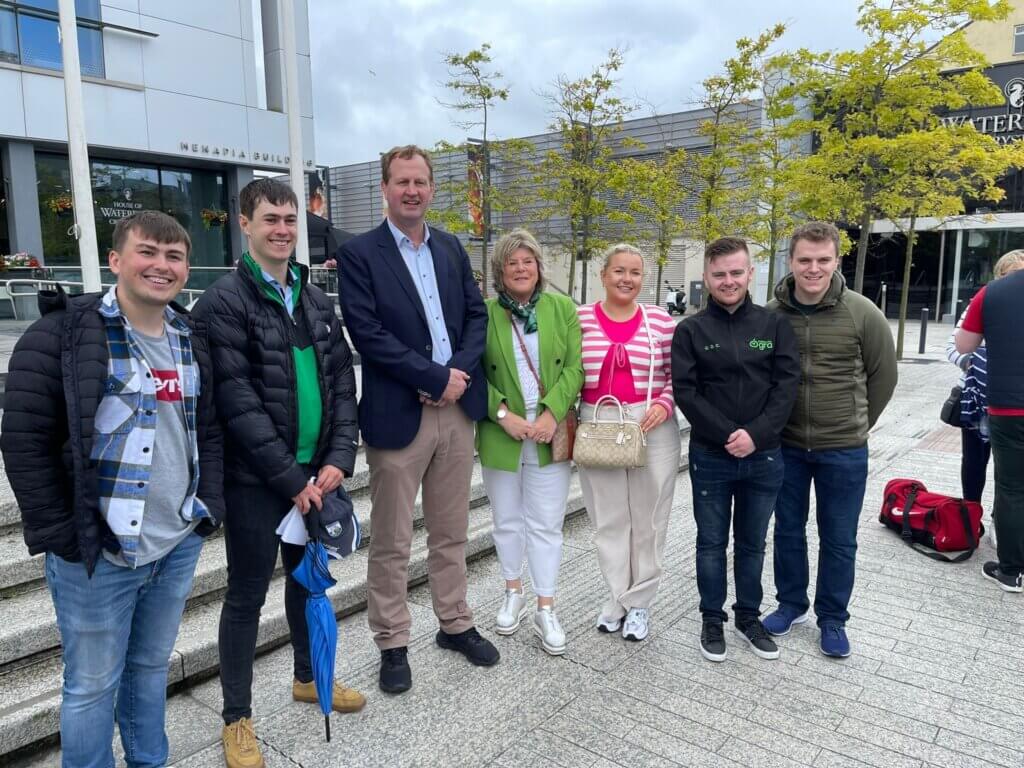
Receiving the Tricolour
In January 1847 Meagher helped inaugurate the Young Ireland Confederation which resulted in many Confederate Clubs being established throughout Ireland to encourage political debate. At the end of March 1848 Meagher, William Smith O’Brien, John Blake Dillon and others traveled to France for the purpose of gaining support from Alphonse de Lamartine, head of the Provisional Government of the Second French Republic. This was the French Republic that abolished slavery in its Territories and established universal male suffrage. Unfortunately, the revolutionary promise of the second French Republic was of little help to those who sought an Irish Republic. Having praised the Irish people, the French politician informed the Irishmen that nothing could be done by France since Ireland was an internal British question. Meagher and the others went home disconsolate but with one remarkable gift. A committee of French woman presented Meagher with a tricolour in Ireland’s colours: orange, green and white. When Meagher subsequently brought it to a meeting of the Confederation John Mitchell allegedly said: “I hope to see that flag one day waving as our national banner”.
On 7 March 1848 Meagher flew it for the first time from 33 The Mall in Waterford. It is important to recall what that flag stood for and why it was presented to and chosen by Young Irelanders. The tricolour he brought back was orange, green and white because green represented Ireland’s Catholics; orange represented Ireland’s Protestants and white represented the unification of them. In April that year Meagher stated: “The white in the centre signifies a lasting truce between Orange and Green and I trust that beneath its folds the hands of Irish Protestants and Irish Catholics may be clasped in generous and heroic brotherhood.”
That was the flag that became the flag of revolutionary Ireland and that was flown during the Rising of 1916. It came to be accepted by the people of Ireland as their national flag. In the Irish Free State it was used officially as the flag of the State and in 1937 Article 7 of the new Constitution stated that “The national flag is the tricolour of Green, White and Orange”.
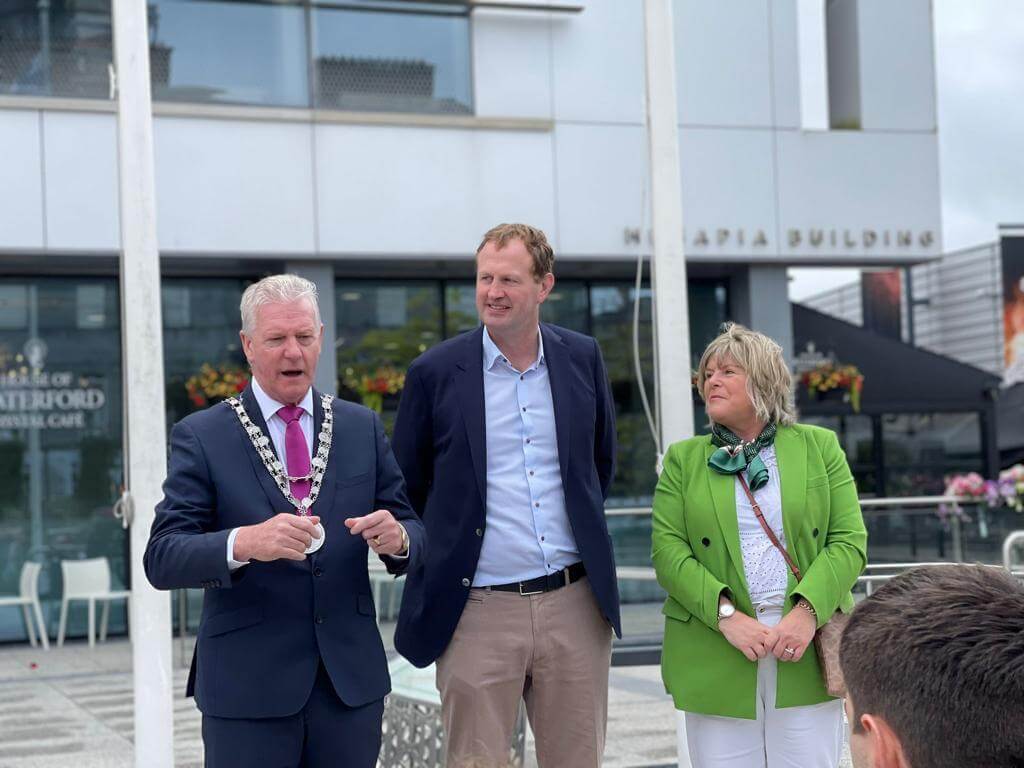
Understanding the Tricolour
We should never lose sight of the fact that the Republican cause in Ireland was founded on the desire to unite Irish people and thus to empower them to govern themselves. These were the objectives that motivated the United Irishmen. It was Belfast’s Samuel Neilson who in early 1791 established the Northern Star newspaper and who along with Belfast Doctor William Drennan sought to establish the Independence of Ireland as a Republic in which all citizens would be treated equally. They were the Belfast Radicals and their cause was complimented by similarly minded people in Dublin, led by Wolfe Tone. They all identified themselves as the Society of United Irishmen. This was not a movement that sought the repeal of the penal laws on simple grounds of Catholic self-interest. It was a diverse movement of people from different religious and geographical backgrounds that wanted to emulate what had been achieved through the establishment of a Republic in France. Although the 1798 Rebellion had failed militarily, it did inspire the cause of Irish Republicans throughout the 19th century.
Between the time that Meagher raised the flag in 1848 and today there have been many occasions when the cause of Irish Republicanism has been misrepresented and indeed debased as a narrow, sectarian, exclusively Catholic enterprise. Regrettably, that is the perception that many in Northern Ireland have, inspired in part because of the violence perpetrated in its name in the latter part of the 20th century. Nonetheless, that should not obscure its true meaning. Nor should it obscure its ability to convey a symbolic message of unity as it sought to do back in 1848.
Diversity and the Tricolour
The traditional definition of Republicanism can be identified in the rallying cry of France’s Liberté, Égalité, Fraternité. A constituent part of modern equality, however, is diversity. Traditionally, equality was viewed exclusively as meaning that people would not be discriminated against or excluded from doing what an appropriate comparator was permitted to do. In our modern society diversity means that all groups within our society play a participating role. It is not simply a case of all groups being equal but rather that such equality is only really present when there is diversity within each part of the State.
In Ireland in the 21st century it means that the important institutions of State should reflect the society that they serve. Traditionally, Ireland, like other countries, was not concerned about its government reflecting the diversity of its society. That was because of the dominance exercised by those who governed Ireland both before and immediately after independence. When Ireland was a colonised country it was subject to the oppressive control of those who represented the interests of the colonial power and its state religion. When Ireland was an independent country its early governments became too subservient to the interests of the Catholic Church. When Northern Ireland was established its governments’ clear political objective was to retain Protestant hegemony within its jurisdiction.
In all of these eras most of the important functions and roles were filled by very similar people who served the political objective of the governing powers. Nonetheless, modern societies require more. The dominant control of any one political ideology is gone. Societies should now be governed by those who take into account the diversity of modern societies. This requires that those who occupy important roles and functions reflect and represent the diversity of the society in which they operate.
In many ways the Irish tricolour was a precursor of the rainbow flag since it is a symbol of inclusivity and liberation. That flag is as much the property of all the people of Northern Ireland as it is of Ireland. Although this State in its early years afforded too much deference and control to the Catholic Church, it has now become a society in which no religion is given preferential treatment and those of no religion are treated the same as those who profess a faith.
Explaining the Tricolour
Why then is this flag of diversity and inclusivity viewed with such negativity by a large section of people who live on this island, namely those whose allegiance is to maintaining the union with Great Britain. The most obvious reason is that those who support the union view the flag as representing a political viewpoint that they oppose and which would see an end to that union. However, an opposing political viewpoint should not arouse the hatred or the animosity or the desire to burn a flag on bonfires along with effigies of those who support its political objectives, as is frequently seen in Northern Ireland. The actual reason, unfortunately, is that politics in Northern Ireland has been defined, both before and after partition, by the contest between green and orange rather than the strength that derives from the combination of green and orange. If an objective person from outside the island of Ireland was asked to design a flag that sought to bring together green and orange on this island there could be no more obvious product than our national flag. Nonetheless, its association in the mind of Unionism with a threat to its political existence and its association with violence in the latter part of the 20th century has had long-term and potentially irreparable consequences for the flag in the mind of unionism. But their assessment of the flag is wrong, just as the assessment of the flag by those who used it as justification for sectarian violence is wrong.
Reunifying Diversity
Invariably when people discuss a United Ireland they resort immediately to questions about what flag, what anthem, what symbol. Although these are symbolically important they are not consequential for people’s lives.
The reason why there should be Irish reunification is because it will enable all the people of this island to prosper economically, culturally and socially in a new political entity that will inevitably provide greater and broader opportunities for young people.
Irish Reunification is not an objective in itself. There is nothing to be grained by rectifying what many view as a historical wrong. What is worth achieving, however, is a country that recognises and cherishes the diversity of its people. It would be extraordinary, remarkable and inspiring if two post-colonial jurisdictions, divided by imperial design, were able, notwithstanding their anachronistic divisions, to reunify in order to enhance and promote their diversity. The partitions that occurred in the 20th century in post-colonial contexts – India, Ireland, Palestine – all arose, in part, as a result of an imperial belief that natives could not govern themselves once Britain departed. It would be an astonishing promotion of diversity if Ireland could show that this legacy of empire no longer subsisted on this island, and if peoples who divided because of their religious and cultural differences decided to reunify because of the richness and wealth of that diversity that was previously viewed as a threat but was in fact their greatest asset.
Submission by Jim O’Callaghan TD to the commission chaired by James Lawless TD to report on the aims and objectives of Fianna Fáil
Introduction
One hundred and four years ago the people of Ireland decided to be citizens of an independent country rather than subjects of an empire. That courageous decision was a success. Ireland is now a sovereign, independent, democratic country subject to the rule of law and controlled politically by the electoral wishes of its people.
Although independence has succeeded, Ireland now faces political and social challenges of immense proportions that require similarly courageous decisions as were made one hundred years ago.
Ireland between 2022 and 2072 will be a remarkably different place to the Ireland of the 20th century. Extraordinary demographic, cultural and political changes have taken place already in the 21st century and it is undeniable that these changes will continue during the next 50 years. Ireland is now a country with a population of over 5,000,000, 13% of whom are non-Irish nationals, with increasing numbers of Irish nationals migrating back into the country.
There are many reasons why Ireland is seen as an attractive place to live, but two are very relevant for the purpose of this submission.
First, Ireland has a dynamic and open economy that provides employment and rewards hard work.
Second, the quality of life in Ireland, as represented by the country’s sense of community and friendliness, is an attraction that is frequently underestimated by long-term residents
Ireland is also a country with a young population that views the economy and the role of government in a different light to how they were viewed in the last century. No longer do Irish people view themselves as being tied to, or thankful for, their initial job.
The dynamism of the Irish economy, as seen in the growth of the technology and knowledge-based sectors, means that people no longer demand what was historically viewed as the security of a permanent and pensionable job. Instead, mobility of employment is viewed as an advantage to be availed of by young workers.
Notwithstanding their attraction to an open and dynamic economy, this new generation of Irish people wants its government to play a role in supporting this dynamic economy and in ensuring that the fundamental requirements for their flexible lives are available and in place – housing, childcare, education, and healthcare.
This generation also wants a government that can respond to the regional imbalance that exists in a country where 29% of the population lives in its capital, whilst an extraordinary quality of life is available for those who make the decision to live in the regions. These are the challenges that need to be focused on by Fianna Fáil during the next 50 years.
That is why there needs to be a new vision in Irish politics. That new vision does not require a new party but instead a new, modern, relevant vision from an established Irish political party that recognises the progress our country can make from the new solid economic and social foundations for which we have all worked so hard in order that our families can prosper.
History can give us confidence that our ambitions can be achieved, but we must change and be more forward looking, more flexible, more ambitious, more caring whilst we continue being uniquely Irish and proud Europeans.
As Ireland has changed, so must our political ambitions. We must build on what we have and prepare new foundations that will ensure prosperity and equality of opportunity for all in housing, childcare, education and healthcare in this new dynamic economy.
We are not starting from scratch, but from a stronger base that, although by no means perfect, can be managed successfully to build a new successful history. This will take time, but the roadmap needs to be established now.
Fianna Fáil needs a vision for Ireland that is based on the notion that equality and opportunity are the bases upon which we can build an Ireland that is kind, fair and efficient.
The Challenges
As we face into the second hundred years of this republic – its second age – our politics and our party are confronted by very different circumstances, in a very different Europe and in a very different world.
The last decade, let alone the last century, has witnessed a tsunami of change that washed away what were once old certainties. In those years, the patterns of political crisis have not been intermittent or cyclical. Our people have been confronted and challenged by unprecedented event followed by unprecedented event – economic, social and, most recently, health.
The pace of these events on our collective lives is only matched by the depth of its effect on our national consciousness and on the lives of our people. The deep uncertainty of this period in our politics is now unfortunately mirrored in the everyday lives of citizens. The fundamentals that underpin the quality of our lives – a decent job, a family home, and our health – are now the very things that have been eroded by uncertainty.
People are naturally wearied by constant crisis and rightly worried by a present, and a future, so saturated in instability. There is now a widespread public hunger for some security and certainty, and people know that the only power and authority capable of providing this is Ireland’s government.
That consensus amongst the Irish electorate has already taken shape. In the last number of elections, we have voted to prioritise improved and expanded public services and increased state intervention. As a party we have recognised that public desire, but we have failed to understand fully the magnitude of the interventions and change which people now expect.
Adults under 40 have seen huge changes in the workplace as a result of the development of a dynamic and flexible economy. They have also experienced significant recessions. Prior to the pandemic they were already finding it very difficult to secure accommodation or achieve financial security. Public policy must intervene to protect and enhance the position of these young people. Political leadership must prioritise them so that their lives can be lived outside the overbearing shadow of financial insecurity. Our party will attract younger voters if we articulate policies that are clear, simple and ambitious, and that will:
• solve their problems (housing and childcare);
• address their anxieties (climate crisis and health), and
• inspire their patriotism (reunification).
Fianna Fáil must be humble enough to accept that in recent elections we have offered a platform that is too small in comparison to the scale of the political context that confronts us. Cautious incrementalism has no place at a time of such defining political change. Our offering needs to be bigger and bolder, and ambitious.
It is right that people expect our policy commitments to be deliverable, but they equally want us to be daring. That means that Fianna Fáil must have the courage to articulate a fuller and firmer vision of the Ireland we wish to create.
The aims and objectives of Fianna Fáil
As a large centre ground national party, Fianna Fáil has been slow and inarticulate in defining for what it stands. Fianna Fáil should have the following 10 aims and objectives:
1. THE REUNIFICATION OBJECTIVE
Fianna Fáil is a republican party that wants to unite and develop an Irish nation in which people of different identities, cultures and beliefs on this island can live harmoniously together and govern themselves within the progressive structures of the European Union.
Fianna Fáil wants to achieve a united Ireland. Our means of achieving this is to bring together the people of the island, not by a takeover of Northern Ireland, but rather by persuading all our fellow country men and women in Northern Ireland, through democratic and respectful political dialogue, that their interests, as well as ours, are best served by achieving unity in a new Ireland that serves the interests of all.
2. THE ENVIRONMENTAL OBJECTIVE
Fianna Fáil stands for the preservation and protection of our environment from the dangers of the climate crisis and pollution. The imperative for urgent action on the climate crisis is now both obvious and overwhelming.
Fianna Fáil will offer realistic and achievable policies that will protect our environment whilst promoting business, protecting rural Ireland, and responding to the needs of local communities. Fianna Fáil believes that sustainable Irish farming and food production is the mechanism through which we can ensure the ongoing protection of our environment.
3. THE CULTURAL OBJECTIVE
Fianna Fáil stands for the preservation and promotion of our rich Irish heritage and culture. In particular, Fianna Fáil recognises how the arts can enhance the lives of Irish people, and how Ireland can continue to achieve international recognition through its promotion of the arts.
Fianna Fáil is committed to promoting policies that protect our heritage and culture, and which will enhance the performance of the arts in Ireland.
4. AIDHM NA GAEILGE
Is é cuspóir Fianna Fáil gach tacaíocht, seirbhís agus áis a bheith ar fáil chun saol a chaitheamh trí Ghaeilge in Éirinn. Is é polasaí Fianna Fáil a seasamh le forlámhas na Gaeilge mar theanga an phobail snalimistéir Ghaeltachta agus pobail nua Ghaeltachta a bhunú.
5. THE FAMILY OBJECTIVE
Fianna Fáil recognises that the definition and understanding of what constitutes a family has changed significantly since Bunreacht na hÉireann came into force. Fianna Fáil supports this broader and more inclusive definition of the family as the primary and fundamental unit group of society and will promote policies that enhance and protect the family and, in particular, the welfare of all children.
This must also extend to ensuring affordable and secure housing and accommodation for all families.
6. THE EDUCATION OBJECTIVE
Fianna Fáil is a party of opportunity and recognises that education has provided Irish people with the chance to improve the quality and enjoyment of their lives. Fianna Fáil is committed to ensuring that education is broadly available to all, not just during school years but beyond into further education.
Fianna Fáil supports a broad definition of further education to include all forms of apprenticeships and wants to ensure that our education system provides pathways to employment for all, and not just for those who are academic high achievers.
7. THE PUBLIC SERVICES OBJECTIVE
Fianna Fáil believes the state has a responsibility to protect its citizens through a strong and well-resourced public sector that enables them to have the fullest access possible to childcare, education, social housing, healthcare, and social protection. Fianna Fáil will support policies that continue to devote significant state resources to funding these public services.
8. THE PRIVATE ENTERPRISE OBJECTIVE
Fianna Fáil stands for the promotion of enterprise and the creation of wealth as a means of improving the standard of living of all our people. Our Public Services objective cannot be achieved unless sufficient wealth is created that results in an increase in available resources.
Experience confirms that this wealth can only be generated by the private sector.
Fianna Fáil believes in rewarding hard work, and in promoting a vibrant private sector that is spread throughout the regions and not concentrated on Dublin. It believes that everyone has the right to develop to their fullest potential and that the State should facilitate this by ensuring our laws reward hard work and aspiration.
9. THE SOCIAL COHESION OBJECTIVE
Ireland has benefited greatly from the social cohesion between employers, employees and other social groups that was pioneered by Fianna Fáil in government. We established agreed structures through which employers and employees, overseen by government, have been able to put in place a fair system for workplace engagement.
As a centre ground national party that seeks to avoid polarisation of employers and employees, Fianna Fáil is committed to the protection and development of social cohesion in order to ensure that fairness and
understanding continue within the workplace and industrial relations.
10. THE HOUSING OBJECTIVE
Fianna Fáil believes in the provision of suitable and affordable housing for its citizens. Exorbitant purchase and rent prices are preventing the majority of young people from accessing affordable and secure accommodation. For many people, particularly those under the age of 40, home ownership or secure rental accommodation is an unattainable dream.
Fianna Fáil believes that this must change, and that no future government can permit a return of the cycle of recession to housing crisis and back to recession. The construction of suitable and affordable housing must be continuous and the attraction of, and reasons for, living outside Dublin in the regions must bepromoted.
How Fianna Fáil can achieve this Aims and Objectives?
During the past one hundred years this country has progressed mainly because of centre ground policies that were advocated and implemented by Fianna Fáil governments.
Fianna Fáil achieved political dominance not because of the stance of its leaders in the civil war but because it was viewed by the majority of the population as being the political party that would protect them. Fianna Fáil did protect people, particularly small farmers and workers. However, as time went on, Fianna Fáil came to view itself as the natural party of government, and then as a party whose sole purpose was to be in government. That attitude undermined its relationship with the people.
Ireland has succeeded as a democracy and country because it was governed from the centre, not the extremes. Unfortunately, the loudest political voices now come from the extremes. The effect of these voices, and possibly their intention, is to polarise politics.
Political polarisation results in the diminution of debate on political issues. Instead of voters arguing about political issues, polarisation seeks to ensure that voters believe that their interests cannot and will not be served by those of a different political persuasion.
Polarisation seeks to make politics tribal. It has happened in the United Kingdom through Brexit; in the United States through the growing contempt that exists between the two main political parties; and in Northern Ireland through the continuation and maintenance of the sectarian divide.
Because of the existence and threat of polarisation, this country has never more needed a strong centre ground national party such as Fianna Fáil. The reason why centre ground national parties, particularly those in post-colonial countries, achieved so much in the twentieth century was because their guiding principles were rooted in the best interests of the people, not the rubric of ideology. They sought to promote policies that protected the interests of their liberated people and that achieved the common good.
Today it is common for a centre-ground national party to be ridiculed and presented as lacking in conviction or meaning. That is wrong. Never before has this country more required a strong centre ground national party that governs not for the benefit of one faction or polarised group, but for the benefit of the country as a whole. Now, more than ever, this country needs a radical and articulate centre ground national party that will not seek to take advantage of people’s disaffection and dissatisfaction, but that will build on the hope and industry of all Irish people.
With other parties now happy to base themselves on the ideological hard left or right, it is now time to fight for a political party of the centre and to protect Ireland from the polarised and intimidatory politics that has contaminated so many other countries.
We should not apologise for putting the interests of the whole nation ahead of the interests of certain groups. The segmentation of politics into mutually antagonistic groups is exactly the problem that has debased and divided the politics of countries like the United Kingdom and the USA. The centre of the nation is where Fianna Fáil stands; the whole of the nation is the interest we wish to serve.
In order to ensure that the party’s aims and objectives are realised we need to change how the party operates.
- Empowering the Parliamentary Party to achieve the aims and objectives.
The Fianna Fáil parliamentary party needs to be given a central role in the development of the party’s strategy and policies in order to achieve its aims and objectives.
Each member of the parliamentary party should be allocated a function corresponding to a government portfolio.
Each of these policy groups of TDs and senators should be headed by the party spokespersons on each portfolio.
Party spokespersons should be given responsibility for proposing the relevant content of any election manifesto. The election manifesto should be the work of the front bench and must require full sign off by the front bench before publication.
The party’s research office should provide secretarial and research supports to these policy groups with each staff member being formally assigned to a committee. The policy formulation process will provide an avenue for party members and activists to have a meaningful input into policy formulation.
Any member or activist who has a policy proposal should be able to identify the staff member who is responsible for supporting the relevant policy committee, and submit suggestions to them for consideration by the relevant committee. Fianna Fáil must welcome the ideas of our members the length and breadth of the country and let those members know that there are meaningful mechanisms by which their ideas can be incorporated into party policies.
We should also create a formal structure for councillors to meet regularly at national and regional level to ensure greater co-operation and information sharing. A unit should be established in Fianna Fáil headquarters, including staff from the party research office, to support councillors in their important work. Our councillors are key to attaining our aims and objectives, and they must be acknowledged and supported.
Preparations for the next Local Government and European Elections must commence now. Our political priority must be to remain the biggest party in local government and to win at least one European Parliament seat in each Euro constituency.
2. Improving the party’s structures to achieve the aims and objectives.
Fianna Fáil needs to have the national and digital campaigning capacity that equals or surpasses its constituency/ground campaign. We need a bespoke digital strategy unit to ensure the aims and objectives of Fianna Fáil are known and promoted online and across social media platforms.
We need to use the expertise that exists within certain members of the parliamentary party, and many skilled individuals across our membership, who have shown that they can run excellent social media campaigns. We must invest in ongoing regular training for constituency officers and organisers. Our greatest political strength remains our local presence in communities, though there are clearly some gaps in urban areas. We must build on our local strengths and both review and upgrade our national structures to empower local party units.
If we are serious about our Reunification objective then we must enhance our relationship with the SDLP. The partnership with the SDLP should be strengthened, developed and advanced with greater interactions between the Oireachtas and Northern Ireland Assembly parliamentary groups and the establishment of standing policy committees to meet regularly and report jointlyto the party leaders.
3. Recruiting new members to promote our aims and objectives.
People do not join political parties in the same numbers as in the last century. However, many people are still interested in getting involved in politics but perceive it as being inaccessible or slow to respond. Fianna Fáil needs to develop a recruitment programme that will seek to attract more members, particularly women and young people, from across Ireland. We should seek to recruit people who want to contest elections on behalf of the party. This recruitment should take place in every townland and urban estate across the country.
To achieve this we must first create a party structure that is driven by ideas and membership input. People must feel that joining Fianna Fáil means contributing to national debate and national politics. That will only happen when people are fully aware of Fianna Fáil’s aims and objectives.
Jim Irelands Future Speech
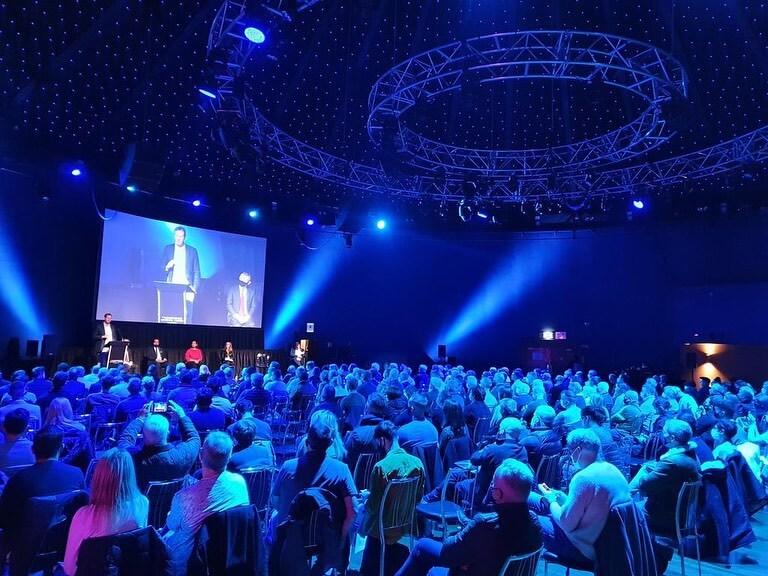
Jim O’Callaghan TD represented Fianna Fáil at Ireland’s Future – Preparing for a United Ireland discussion at the Mansion House in Dublin 6th of November 2021.